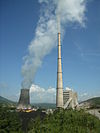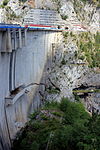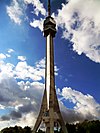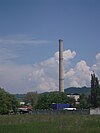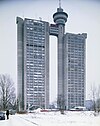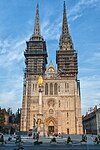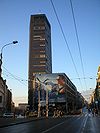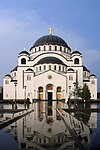
Maribor is the second-largest city in Slovenia and the largest city of the traditional region of Lower Styria. It is also the seat of the City Municipality of Maribor, the seat of the Drava statistical region and the Eastern Slovenia region. Maribor is also the economic, administrative, educational, and cultural centre of eastern Slovenia.

Slovenia, officially the Republic of Slovenia, is a country in Central Europe. It is bordered by Italy to the west, Austria to the north, Hungary to the northeast, Croatia to the southeast, and the Adriatic Sea to the southwest. Slovenia is mostly mountainous and forested, covers 20,271 square kilometres (7,827 sq mi), and has a population of 2.1 million. Slovenes constitute over 80% of the country's population. Slovene, a South Slavic language, is the official language. Slovenia has a predominantly temperate continental climate, with the exception of the Slovene Littoral and the Julian Alps. A sub-mediterranean climate reaches to the northern extensions of the Dinaric Alps that traverse the country in a northwest–southeast direction. The Julian Alps in the northwest have an alpine climate. Toward the northeastern Pannonian Plain, a continental climate is more pronounced. Ljubljana, the capital and largest city of Slovenia, is geographically situated near the centre of the country.

The location at the junction of the Mediterranean, the Alps, the Dinarides and the Pannonian Plain and the area being traversed by major rivers have been the reasons for the intersection of the main transport routes in Slovenia. Their course was established already in Antiquity. A particular geographic advantage in recent times has been the location of the intersection of the Pan-European transport corridors V and X in the country. This gives it a special position in the European social, economic and cultural integration and restructuring.
Since Slovenia declared independence in 1991, its Governments have underscored their commitment in improving cooperation with neighbouring countries and to actively contribute to international efforts aimed at bringing stability to Southeast Europe. Resource limitations have nevertheless been a problem hindering the efficiency of the Slovenian diplomacy. In the 1990s, foreign relations, especially with Italy, Austria and Croatia, triggered internal political controversies. In the last eight years, however, a wide consensus has been reached among the vast majority of Slovenian political parties to jointly work in the improvement of the country's diplomatic infrastructure and to avoid politicizing the foreign relations by turning them into an issue of internal political debates.
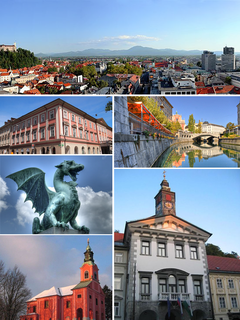
Ljubljana is the capital and largest city of Slovenia. It is the country's cultural, educational, economic, political and administrative center.
Adria Airways d.o.o. was the flag carrier of Slovenia, operating scheduled and charter services to European destinations. The company's head office was at Ljubljana Jože Pučnik Airport in Zgornji Brnik, Cerklje na Gorenjskem, near Ljubljana. On 30 September 2019, the airline declared bankruptcy and ceased all operations.

Borut Pahor is a Slovenian politician serving as President of Slovenia since December 2012. Previously, he served as Prime Minister of Slovenia from November 2008 to February 2012.

Prishtina International Airport Adem Jashari, also referred to as Pristina International Airport, is an international airport in Prishtina, Kosovo. The airport is located 15 km (9.3 mi) southwest of the city of Pristina, Kosovo. The airport has flights to numerous European destinations.
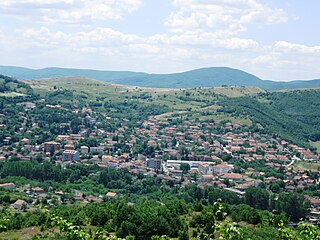
Zvečan or Zveçan is a town and municipality located in the Mitrovica District in Kosovo. As of 2015, it has a population of 16,650 inhabitants. It covers an area of 122 km2 (47 sq mi), and consists of a town and 35 villages.

Šoštanj is a town in northern Slovenia. It is the seat of the Municipality of Šoštanj. The area is part of the traditional region of Styria. The entire municipality is now included in the Savinja Statistical Region.

Nebotičnik is a prominent high-rise located in the centre of Ljubljana, Slovenia, and is one of the city's most recognisable landmarks. Its thirteen storeys rise to a height of 70.35 m (231 ft). It was designed by the Slovenian architect Vladimir Šubic for the Pension Institute, the building's investor. Construction began on 19 April 1931 and the building opened on 21 February 1933. It was, upon completion, the tallest building in the Kingdom of Yugoslavia, and the ninth-tallest high-rise in Europe. It was and would remain for some time the tallest residential building in Europe.
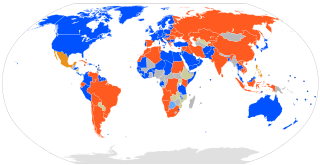
International recognition of Kosovo, since its declaration of independence from Serbia enacted on 17 February 2008, has been mixed, and international governments are divided on the issue.
Kosovo was a part of several international sports federations in the 1990s, and has applied to become a member of many more after its 2008 declaration of independence from Serbia.
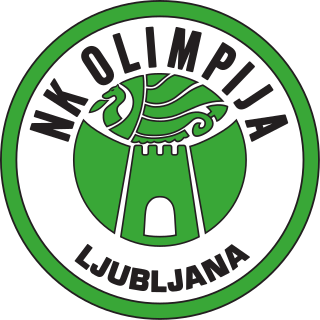
Nogometni klub Olimpija Ljubljana, commonly referred to as NK Olimpija Ljubljana or simply Olimpija, was a Slovenian association football club based in Ljubljana. The club was founded in 1945 under the name NK Enotnost and adopted the name Olimpija in 1962.

Egyptian–Kosovan relations are foreign relations between Egypt and Kosovo.
Kosovo's declaration of independence from Serbia was enacted on Sunday, 17 February 2008 by a unanimous vote of the Assembly of Kosovo. All 11 representatives of the Serb minority boycotted the proceedings. International reaction was mixed, and the global community continues to be divided on the issue of the international recognition of Kosovo. Greece's reaction to the 2008 Kosovo declaration of independence in general is neutral.

Kosovo's declaration of independence from Serbia was enacted on Sunday, 17 February 2008 by a unanimous vote of the Assembly of Kosovo. All 11 representatives of the Serb minority boycotted the proceedings. International reaction was mixed, and the world community continues to be divided on the issue of the international recognition of Kosovo. Libya extended official diplomatic recognition to Kosovo on 25 September 2013.

Kosovar–Ugandan relations are foreign relations between Kosovo and Uganda. Formal diplomatic relations between two states are non-existent as Uganda does not recognize Kosovo as a sovereign state.
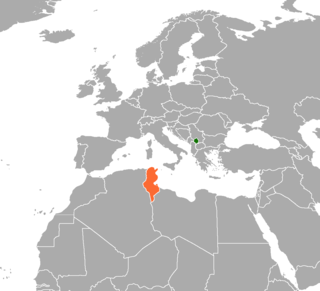
Kosovar–Tunisian relations are foreign relations between Kosovo and Tunisia. Formal diplomatic relations between the two states are non-existent as Tunisia does not recognize Kosovo as a sovereign state.







